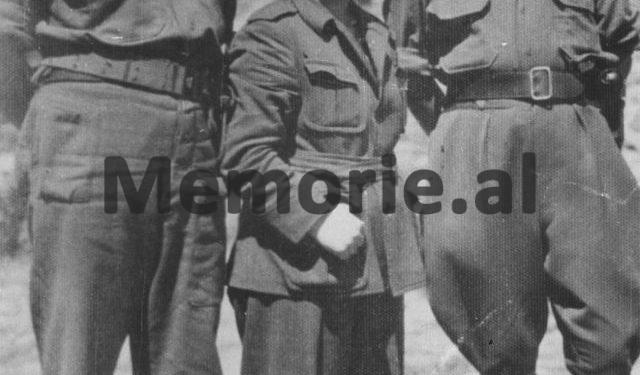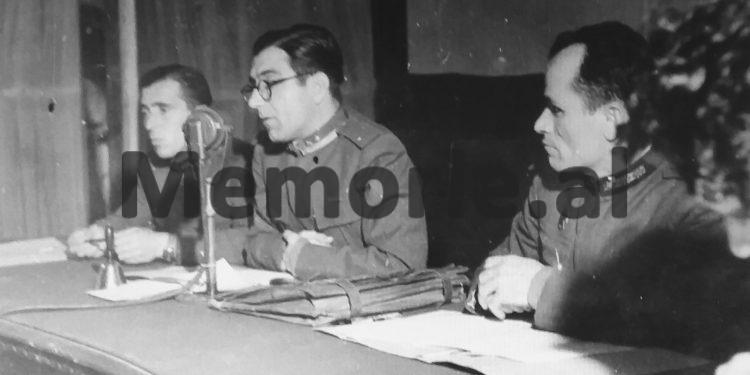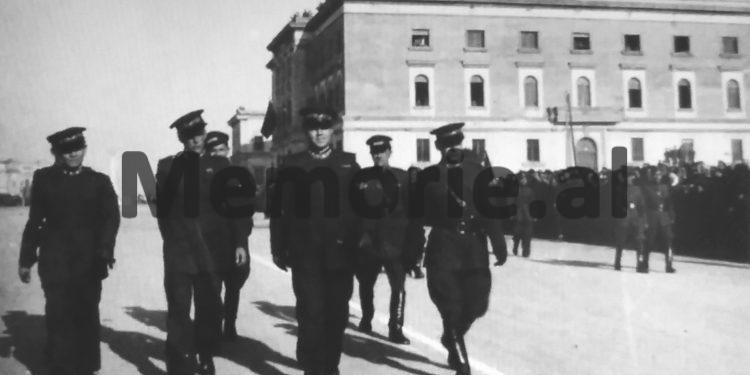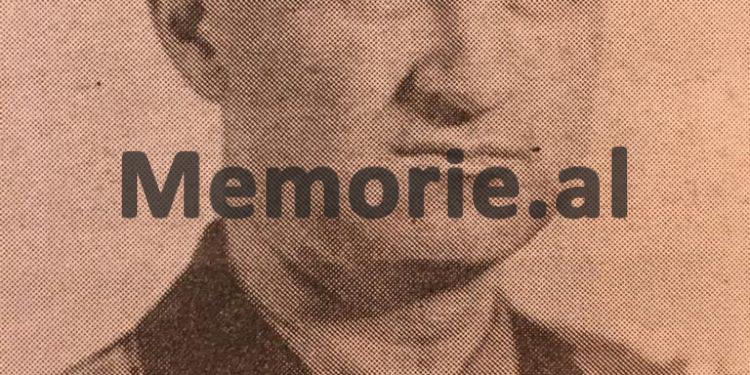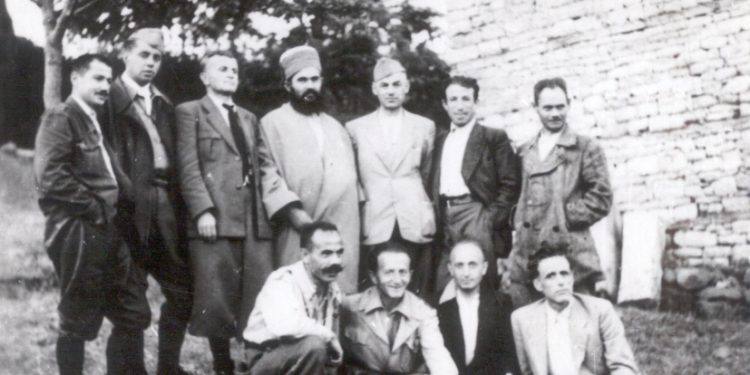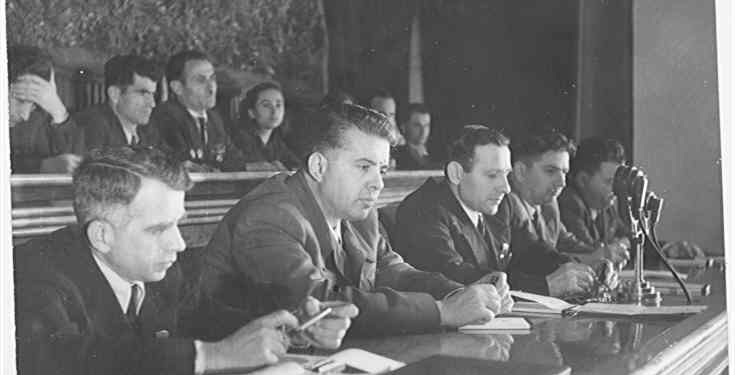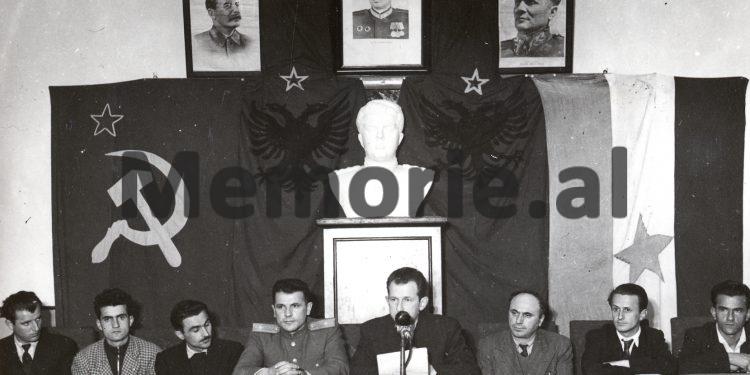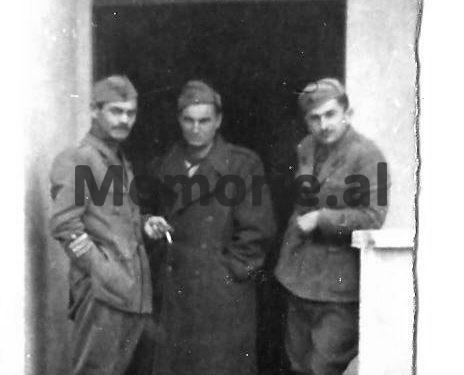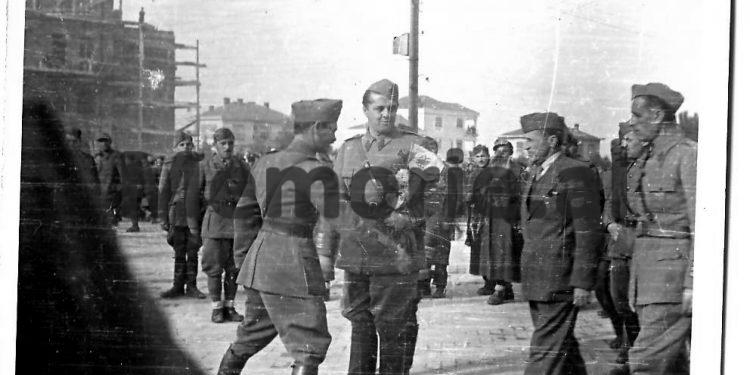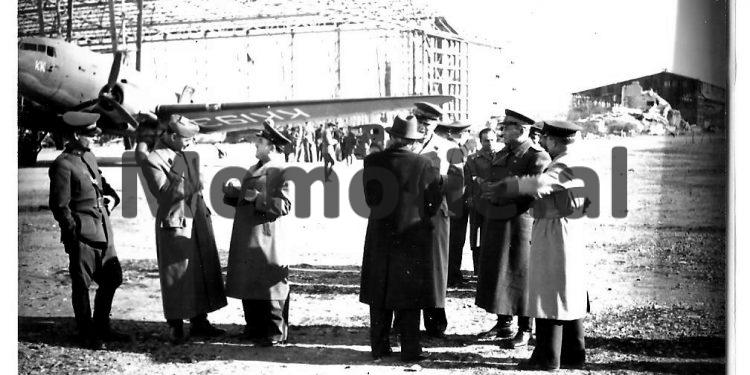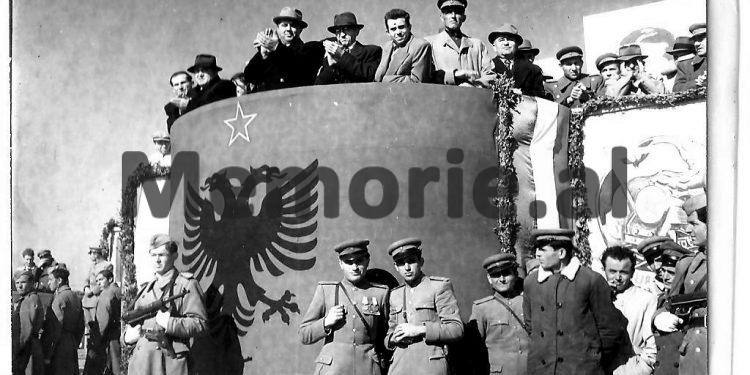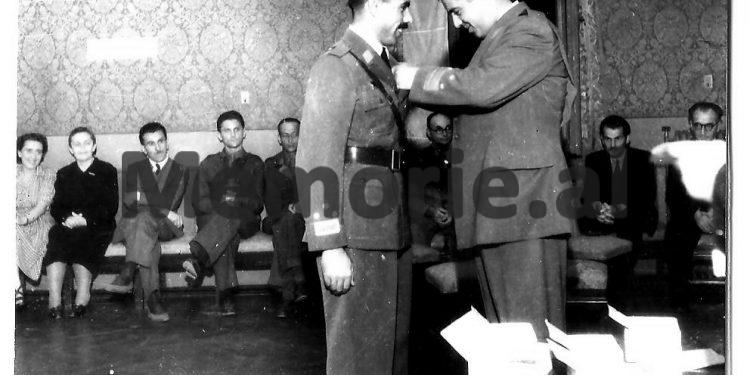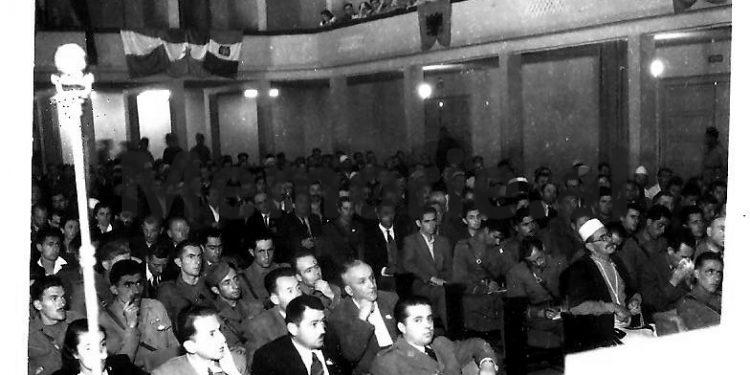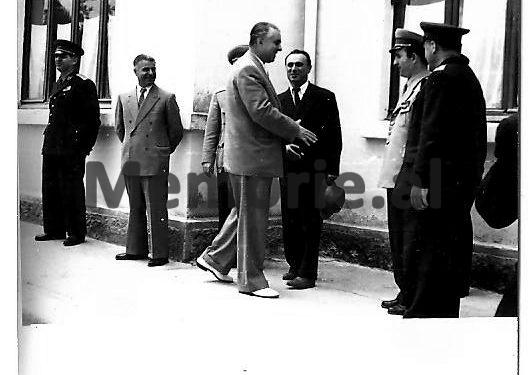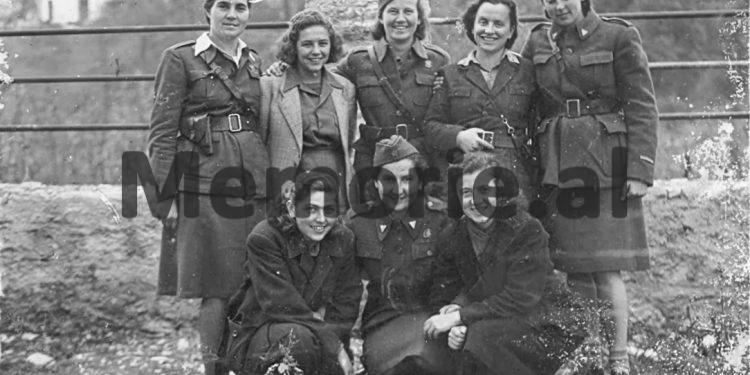Dashnor Kaloçi
Memorie.al publishes the unknown story of the sensational trial that took place in 1956 in Tirana against Major General Dali Ndreu, the former Commander of the First Corps during the War and his wife, Liri Gega, a former member of the Politburo. who was sentenced to death after being accused of being “agents of Tito’s Yugoslavia” and executed? The rare testimony of Mustafa Qilimi, former Vice President of the Supreme Court and President of the Military College, regarding the machinations and intrigues that were used at that time to punish the “Dali Ndreu group” by Enver Hoxha, who after following Directly recorded by his office, the entire closed-door trial was ordered by Rita Markos for Aranit Çela, the President of the High Court, who, after initially hesitating to impose capital punishment, was forced to accept it.
“As rarely before since 1951, when I went to that court, before the trial of Dali Ndreu and his so-called group, there was an extraordinary interest and preoccupation from the Ministry of Interior, Investigation, Central Committee of the ALP. and the highest leaders of the Albanian state, including Enver Hoxha himself. One night before the trial, the State Security, with great secrecy, placed the recording device under the podium of the hall and connected it with the office of Enver Hoxha. Enver wanted to hear the whole trial himself directly, and that had to be kept secret. This is how the recording device was assembled under the tribune of the trial panel, in such a disguised way that it did not seem at all, of which only I and Aran Çela were aware. I say that for this reason, the trial took place in that very hall and not in the courtroom inside the premises of the High Court, which could not ensure the placement of the recording device and the secrecy of the connection with Enver Hoxha’s house “. This is how the retired colonel, Mustafa Qilimi, the former vice-president of the High Court of the People’s Republic of Albania, recalled, the preliminary measures for the sensational trial against Major General Dali Ndreu and his wife. Liri Gega, a former member of the Politburo, who in 1956 was sentenced to death and shot. How did that trial unfold, what were Daliu and Liria and the other two members of that “group” accused of, and what were the messages given to them by the senior leadership of the judiciary through Rita Marko, who met daily with Enver Hoxha, receive and forward his orders ?! Why did the trial panel hesitate at first about the death penalty and why did Aran Çela later admit it after the meetings with Rita Marko? Being in the position of Vice President of the High Court from 1951 to 1960, Colonel Mustafa Qilimi in his public testimonies showed us one of the darkest pages of the communist regime led by Enver Hoxha, who through intrigues, machinations and pressures on the Politburo, the Government and the Supreme Court, managed to eliminate some of his opponents within the top leadership, accusing them of “traitors and enemies of the People”, such as Major General Dali Ndreu, a member of the Bureau Political, Liri Gega, Secretary of the Central Committee and Minister of Education Bedri Spahiu, organizational secretary of the Central Committee of the ALP and Deputy Prime Minister Tuk Jakova, etc. Regarding these and many other events with intrigues, machinations, traps, revenge, purges, mounted processes, etc., personally initiated by Enver Hoxha himself, it is discussed in the following interview.
Mr. Qilimi, why were you assigned to the trial panel that would try Dali Ndreu’s group?
At that time, I was the Vice President of the Supreme Court and at the same time the President of the Military College at that Court. Having these functions, of course, my appointment as part of the body that would judge Dali Ndreu’s group was more than normal.
How do you remember the atmosphere before the trial began?
As rarely ever since 1951 when I had gone to that court, before the trial against Dali Ndreu and his so-called “group”, which included his wife. Liri Gega, her brother, Astrit Gega, and Vasil Shanto’s brother-in-law, Colonel Petro Bullati, had tremendous interest and preoccupation from the Ministry of Interior, Investigation, the Central Committee of the ALP and the top leaders of the Albanian state. , including Enver Hoxha himself.
Who were the other people who made up Dali Ndreu’s group and what functions did they have?
Dali Ndreu, who was from Slova in Dibra and came from the Ndreve tribe, one of the most patriotic families in almost the entire North of Albania, was considered the leader of that group. That family unreservedly supported the Anti-Fascist War, giving many of its partisan sons, some of whom held leading positions until brigade commanders, such as Esat Ndreu and Daliu himself, who became commander of the Division and the First Corps, with the rank of general. major since the Përmet Congress. Liri Gega, Dali’s wife, was also a defendant in that group. Liria, during and after the War, was the partisan who achieved the highest party functions, being a member of the Politburo since the Berat Plenum, one of Enver Hoxha’s closest associates. Along with Liberty, her group included her brother Astrit Gega, a well-known intellectual activist of the War and after her, Secretary of the Party Committee in Gjirokastra. He then studied in the Soviet Union and was appointed a chemical engineer in Elbasan, where he worked until his arrest. Along with this was Petro Bollati (Vasil Shanto’s brother-in-law), who during the war reached the brigade commander and in 1945, was appointed commander of the Third Brigade of the Defense Division that fought against the anti-communist forces of the Shkodra Mountains…
What functions did they hold when they were arrested?
Although Dali Ndreu was one of the main military figures of the War after Spiro Moisiu, he was dismissed as a general in 1947 and later appointed and worked for several years as Deputy Minister of Construction. In 1954, he was fired from that position and it seems to me that he was appointed director of a construction company in Tirana, a position he held until the day he was arrested. At the time, it was said that the general’s degradation and a crackdown on him came as a result of his marriage to Liri Gega, a former member of the Politburo who had been beaten since 1947 by Koçi Xoxa. Liberty’s brother, Astrit, as I said, was an engineer in Elbasan. Petro Bollati, after being released as a soldier, was waiting to go to Macedonia. Petro was a Macedonian citizen and had applied to go to his home country after being granted that citizenship by the Albanian state, had been granted the relevant permit to repatriate, and was awaiting a Yugoslav visa to leave Albania.
You said above that for the trial of Dali Ndreu and his group, the state had a great interest. Where did this consist?
I want to emphasize that before the start of the trial, I was summoned to the Central Committee of the ALP and we were informed that I would be the chairman of that trial. Based on this, they brought me the investigative file to study it in advance, such as court proceedings. After carefully studying that file, I returned it to the Investigator for further investigation, as nothing came out of the accusation made against that group.
What were Dali Ndreu and his group accused of in the prosecution indictment?
In the indictment of the Prosecution, Dali Ndreu and Liri Gega were accused of “high treason”, specified by “espionage, attempted escape abroad and agitation and propaganda against popular power”. Astrit Gega and Petro Bollati also had these accusations. Unlike the two, Daliu and Liria had more of an escape attempt.
Why didn’t you sue, as you were told in the Central Committee?
I do not know for sure, but I think one of the main reasons I was removed from office as chairman of that trial was that I was not diligent about punishing them. This came after the return of the investigation I made to the file of that trial. After the file came to us for the second time, allegedly completed according to our requests, our orientation came and we were told in the Central Committee that Comrade Enver thought that Arian Çela should be the presiding judge of Dali Ndreu. As we were told and decided: Aranit Çela would be the presiding judge, and I with Hilmi Telegraf, a member. Siri Çarçani, who was the General Prosecutor of the Republic, was appointed Prosecutor for the Defense of the Prosecution, although against his will.
Once again, where was the extraordinary interest in that trial?
The first, as I said above, was Enver Hoxha’s direct interest in electing the trial panel for Dali’s trial, for which we were summoned to the Central Committee and given the relevant instructions. Likewise, before the trial, the Central Committee and the government attached great importance to that process, until a government commission was set up to monitor the entire investigative and judicial process related to that problem.
Who would head that government commission?
The chairman of this commission was appointed Deputy Prime Minister and Minister of Defense, Beqir Balluku, and Niko Çeta, Deputy Minister of Interior, and the Chairman of the Investigative Group for Dali, Liberty, Astrit and Petro Bollati. The trial was set to take place in a courtroom adjacent to the Supreme Court, and the day before, strict security measures were taken, surrounding the area with numerous police officers, reinforced with Republican Guard soldiers. Also for the whole night, State Security made the connection from the courtroom with the office of Enver Hoxha. Enver wanted to hear the whole trial himself directly, and that had to be kept secret. This is how the recording device was mounted under the tribune of the trial panel, in a very disguised way that did not seem at all, of which only I and Aran Çela were aware. I say that for this reason, the trial took place in that hall and not in the courtroom of the High Court, which could not ensure the placement of the recording device and the secrecy of the connection with Enver Hoxha’s house. A few days before the opening of the trial, while we were studying the court file, the Ministry of Interior and the Investigation Service was serving us information as if hostile groups related to Dalin Ndreu had been discovered, that he was: “a spy of the Yugoslavs and that his house in Slovakia was an old residence of Serbian espionage, that the intelligence groups that had been discovered, had intended to rob Dali from the Tirana prison where he was being held for investigation, etc. ”. As I found out later after that trial, that news was completely fabricated and was made to us as a form of pressure, seeing not our proper predisposition as a court, for their death sentence, for which it was suggested to us by K.Q.
The trial was held behind closed doors?
The day the trial began, we were instructed by the Central Committee that the trial against Dali Ndreu and his group would be held behind closed doors. It was the first time such a thing had been done.
But why was this being done?
This was camouflaged by the fact that there were state and military secrets in the process, where the Ndreu family had long since become the residence of Yugoslav espionage. We often held closed-door trials, but there was no shortage of lawyers and people from the Ministry of the Interior and the Ministry of Justice. And in that trial, for the first time, such measures were taken that absolutely no one would be allowed inside. The Minister of Justice, Bilbil Klosi, was even banned from attending, and we did not let him in. While the Minister of Defense, Lieutenant General Beqir Balluku, who was appointed as the Chairman of the Government Commission for following that process together with Niko Çeta, stayed in the building that was adjacent to the High Court, which was the Directorate of Intelligence Discovery (today Leaf House).
How do you remember the beginning of that trial?
Following the formalities of the opening of the trial, the indictment was read by Prosecutor Siri Çarçani, where, as I said above, Dali Ndreu and his group were charged with “high treason, espionage, attempted escape, and agitation and propaganda.” After reading the indictment, the defendants were asked if they accepted the charge. The first to be brought was Dali, who said he did not accept the charge. He was followed by his wife Liria, who told him: ‘Why don’t you admit the accusation, you Dali, you wrote me a letter and told me to accept all the accusations, and we have nothing to do that they know everything’. After Liria’s words, Dali stood up and said that it was not true that he had written a letter to her. Liberty apparently realized he had fallen into the trap and withdrew immediately. They were followed by Astrit, who partially admitted the charge, who said that in family discussions, he could have discussed some minor grievances regarding the supply of food to the people, but had never thought of doing agitation and propaganda. As for the charge of high treason, and the attempted escape, Dali and Liria did not accept it, saying that they had gone to their home in Slovakia to take their son Sokolin for treatment, for whom doctors had recommended mountain climate. Dali stressed that he did not intend to escape, as he had previously had the opportunity to do so, but had no reason to do so. In fact, when Daliu and Liria went to Slovakia, they noticed the people of the State Security who were allegedly following them in order to catch them in the act of attempted escape. After that, they returned to Peshkopia, where they were arrested, far from the state border.
But did Petro Bullati accept the accusation and what was it?
For Petro Bullati, the accusation was that he had “mediated by linking Dali to Freedom with the First Secretary of the Yugoslav Embassy in Tirana, an Albanian from Kosovo named Rexhep Xhiha, with whom they had carried out espionage to the detriment of Albania.” They both admitted that they had met Rexhepi with whom they had only had family conversations and nothing more, and Petroja had mediated this, and he also admitted that he had met them. As I said, Petro Bullati, in the days before his arrest, was waiting for his visa to leave Albania permanently, as he had dual Yugoslav-Albanian citizenship and was waiting to flee to Yugoslavia. When he applied for a visa, Rexhepi would give him a visa for two or three days. But he had asked for an honor, telling her he wanted to meet Dali and Liberty after getting to know them. Petro informed them both that they had to meet with Rexhepi, at the park of Rinia Park, in front of Hotel Dajti. Since Rexhepi’s daughter-in-law had given birth to a daughter, Daliu and Liria, they went to congratulate him the next day, taking a cake to the “Dajti” Hotel where he lived. Petro Bullati said that he did not know more than that, regarding the espionage accusation made against them with Rexhepi, the official of the Yugoslav embassy. During the trial, Petroja addressed us at the trial panel, telling us: “When the atlases are occupied, we pay the donkeys.” Petro meant Enver and Tito to the Atlas. After his speech, we of the trial panel met with the prosecutor and came to the conclusion that he was a very dangerous agent of the Yugoslavs.
How did the trial proceed?
Every hour and a half we would take a break and Aran Çela would go and report to Beqir Balluku, who was hiding in the agency’s intelligence building, next to us, informing him of the progress of the trial and taking instructions. He insisted that there were hostile activities in that group and that they should definitely be sentenced to death. The three of us in the second instance met and told each other that there was no hostile activity and that there was no way we could sentence them to death. All three of us were of this opinion.
But Aranit Çela was of the opinion that that group did not have hostile activities?
For the sake of truth, it must be said that Araniti was in agreement with me and Hilmi Telegraf. After that, the three of us agreed that Araniti should go to the Central Committee and talk there about the problem we had. He went there and talked to Rita Marko, the secretary of the Central Committee that covered the organs of the “Dictatorship of the Proletariat.” He spoke with him in the presence of Beqir Balluku and Ll.S., the head of administration covering the bodies of the “Dictatorship of the Proletariat” in the Central Committee. Araniti came and told us that in the Central Committee of the ALP, Rita Marko had told him: foreign agencies are punished ”.
How did you do after that?
Even after these words were said to Aranit, we continued the trial convinced that there was no hostile activity and that there was no evidence that they would be sentenced to death. Having this big problem, Araniti fell close and went back to the Central Committee to talk about what we were doing. During the break that Araniti went there, the Minister of Justice, Bilbil Klosi, called me and told me why he had not been allowed to attend the trial. I told him that thing was custom-made from above.
Did he react after that?
Bilbili told me that at all costs we should insist that they not be sentenced to death, as they had done nothing. And that there was no evidence to blame them. Bilbili told me in good faith that I had many friends. “If you do this, it will be a great shame not only for you but for the whole history of the Supreme Court,” he told me when we parted. His close friend Josif Pashko, etc., was of the same opinion.
What did Aranit Çela tell you when he came from the Central Committee?
When Aranit went there, the second time they said, “You will punish them with death because we will not shoot them and we will forgive them their lives in the People’s Assembly.” We will do this to expose the agency activity of the Yugoslavs and Tito. ” Araniti accepted that order. In addition, during the hearings, the head of the investigation and many other people from the Ministry of Interior came there, bringing us news as if some spy groups had been discovered that wanted to kidnap Dali and Liria, on the way to the investigation room. trial. And after that, they would assassinate us, the trial court, and so on.
Did you believe what they were told?
To be honest to the end, we did not believe them, nor could we oppose them. These things made them convince us of the guilt of Dali and his group, as they saw that we lacked the proper motivation to sentence them to death. And to make that news as credible as possible, Aranit was put in charge of a bodyguard who accompanied him everywhere.
Did you agree to sentence them to death?
Unfortunately yes. This came after a lot of pressure. According to the order given by the Central Committee and especially by Rita Marko, who had transmitted the message of Enver Hoxha, Araniti formulated the decision for Dali, Liria, and Petron, taking for granted all the accusations made against you and in the end, they were notified of the death sentence. We only condemned Astrit for agitation and propaganda. After all, both Araniti and I knew him well and were not convinced of the accusations against him.
How were Dali and Liria treated during the investigation?
From the reliable data I had then, I can say that a barbaric investigation process has been carried out against them. Both Dali and Lirina have been tortured in the most inhumane way. They left their freedom without food, and when they brought it to her, she was forced to eat it where she had met her personal needs. According to the investigative procedures, Dali and Liria had to face each other several times in the investigator’s office, but that never happened. Dali did not accept any of the accusations made against him and in order to break him, they took him out for ventilation and passed him in front of Liberty’s cell so that he could see how he had become. Before sentencing, I asked the head of the investigation, Nevzat Haznedari, how was the paperwork that Liria told Dali in court? He told me in confidence that during the investigation of Daliu, they took his signature at the end of the letter for each deposit. Taking advantage of this, they had inserted in the middle of the written letters, a white paper, which Daliu signed knowing that it was with his deposits. As he later told me, they had found a man who knew Dali’s writing well and prepared a letter that he allegedly sent to Liberty, telling him to accept everything because they had no other choice.
After the trial he was called your bosses you had above?
At the end of that trial, I was summoned to the Central Committee of the ALP, and Ll.S. He told me that since the opening of the election campaign was coinciding with that day, for the elections in the People’s Assembly, I had to go to the “8 November” neighborhood at the Party House. After opening the meeting, I had to communicate to those present in the courtroom the death sentence for Dali, Liberty, and Petron, as well as their execution that had taken place in those same days. According to his order, I should have given that news since I was the secretary of the basic organization of the Party for the High Court.
Did you carry out that order?
Definitely, after I gave the news in question, the hall silently silenced the two or three people who applauded. When I went to the Central Committee to report on this meeting, I told him about the silence of the hall when I reported the news. He got angry with me and told me I hadn’t raised the issue properly. I explained that I had done it point by point. On the same day, what was assigned to me was assigned to Aran Çela, who had been delegated to another neighborhood. As for Bilbil Klosi’s complaint that why we did not allow him to participate in that trial, the complaint that I also supported, we went to Rita Marko and he told me: “Bilbili as Minister of Justice, must participate in any trial, but there are also special cases in which he is denied this”.
Is it true that Liri Gega was pregnant when she was shot?
I don’t know what to say about this problem, because it didn’t go to court then. But then this problem was raised by the Yugoslavs, and in my opinion, it does not stand.
Continue to the next issue




